Diversity
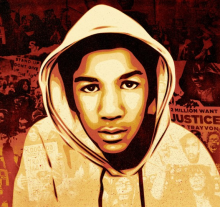
As we inched our way forward, the four lanes of the highway converged into one lane as we made our way around a terrible accident. We joined the long line of cars that passed the scene of the accident one by one, and we slowed — as did the others — to see what we could of the crash. But the moment we moved past the accident, the highway opened up to us, inviting us to freely and quickly accelerate.
And I began to think that tragedies like these cause us to slow down, and even come to a stop. They cause us to open our eyes for a moment and see that our actions have consequences. But on the other side of these tragedies, we tend to somehow find the freedom to move on, and to move on with strength. The only question is whether or not we will take what we see to heart, and resolve to be better drivers on the other side.

The metro is crowded today, and the 20-something, well-dressed white man has to stand, one hand holding the bar and the other his smartphone. It’s the end of the day. All the commuters — but one — are turned toward home. The young man’s face, like most of the others, is dulled with exhaustion. No one makes eye contact.
In a seat near the door, one woman sits facing everyone, looking backward. She studies the young man’s face intently, uncomfortably. He shifts. She rearranges the bags at her feet. Her reflection in the window shows an ashy neck above her oversized T-shirt collar. The train hums and clicks through a tunnel. As if in preparation, she takes another sip from the beat-up plastic cup she’s holding.
At last, she raises her voice and asks: “Why are white people so mean?” Boom! The electricity of America’s third rail crackles through the train. Faces fold in like origami or turn blank like a screensaver.

My father is white, and has lived a different story. My son was the same age as Trayvon Martin when Martin was killed in Florida in 2012. My white teenage son lives a different story. But when I got on a flight early on Sunday morning following the verdict, I was seated next to an African-American woman with six children. The weight of the verdict was on her face, and she showed me a photo of her three sons, all wearing hoodies, for whom Martin’s death and the subsequent verdict hit very close to home. This is their story.

More than 1,100 American Jewish athletes will be competing in the Maccabiah Games, known as the “Jewish Olympics” and held in Israel once every four years.
This year’s event, which begins July 18, brings together more than 9,000 athletes from 77 countries to compete in 38 sporting events. The American contingent is the largest visiting delegation.
The Maccabiah attracts well-known and lesser-known athletes. This year’s participants include swimmers Garrett Weber-Gale, who won gold medals in the 2008 Olympic Games in Beijing, and Mirjam de Koning-Peper, one of three medal winners in the London 2012 Paralympics.

Howard Thurman says three things, in Jesus and the Disinherited: One — God is on the side of the oppressed and the poor. Know that God is on your side. Two — Dishonesty takes you out of the conversation. And if you live an honest life, if you have integrity, you can sit at the table. In areas of race, people look for holes in your character as excuses for you not to be at the table. Three — Hate is useless. Don’t let hate sink into your soul, because hate will destroy you. And respond with love even if it’s hard. So I try to teach my boys that, and raise them that way.
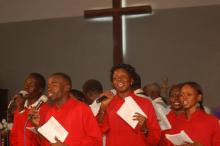
Despite a promise by the Sudanese government to grant its minority Christian population religious freedom, church leaders there said they are beset by increased restrictions and hostility in the wake of the South Sudan’s independence.
In 2011, South Sudan, a mostly Christian region, split from the predominantly Muslim and Arab north, in a process strongly supported by the international community and churches in the West.
The two regions had fought a two-decade long civil war that ended in 2005, following the signing of the Comprehensive Peace Agreement. The pact granted the South Sudanese a referendum after a six-year interim period and independence six months later. In the referendum, the people of South Sudan chose separation.
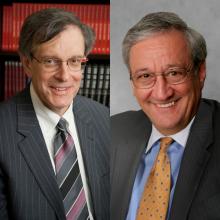
Serving in the armed forces is one of the most honorable professions one can choose in our society. And putting one’s life on the line in defense of freedom is a sacrifice the rest of us can never repay.
That’s why it saddens us that these very freedoms are being undercut by forces seeking to infuse the military with a very specific version of Christian culture. Leaders from the religious right claim that the religious liberty rights of Christians are under assault in the military. This is simply not true, and the implication is an insult to people around the globe and here at home who truly do face persecution for their faith.
What is true is that military life is different than civilian life. A chain of command impacts every aspect of a service member’s life; because of that, safeguards must be in place to ensure that no member of the military is being coerced into religious practices unwillingly.
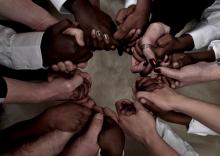
Death is horrible enough. But systematic injustice — one that allows white boys to assume success, yet leads black boys to cower from the very institutions created to protect our own wellbeing — is a travesty. Listen to the stories from Saturday and Sunday nights, of 12-year-old black boys who asked to sleep in bed with their parents because they were afraid. If black youth in America can’t rely on the police, the law, or their own neighborhood for protection — where can they go?

The recent “not guilty” verdict out of Sanford, FL, reflects the principle of the American legal system that if there is reasonable doubt, courts will err on the side of innocence. I dispute neither the principle nor the decision by the jury. But that doesn't leave me satisfied about the outcome.
Jesus said that true justice exceeds that of “the scribes and Pharisees” — and the same could be said of the prosecution and defense. Legal justice seeks only to assign guilt or innocence. Holistic justice works for the life, liberty, and well-being of all. And it especially works for reconciliation between the two Americas that can be identified by their reaction to the case.
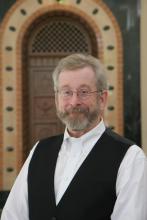
Most people have heard of Hanukkah and Passover and maybe Yom Kippur — the Jewish Day of Atonement. But Tisha B’Av?
Translated as the ninth day of the Hebrew month of Av, it counts as one of the most important days on the Jewish calendar. But even many Jews have not heard of this period of mourning, which requires a 25-hour fast to commemorate the destruction of the First and Second Temples in Jerusalem.
Tisha B’Av, many rabbis say, can be a tough sell, in part because a radical group of far-right Jews wants to rebuild the temple on the site of what is now the Al-Aqsa Mosque, one of Islam’s most revered sites.

Is calling someone a “pagan” a bad thing or a badge of honor? Do we even know what the term means?
Those questions were prompted by a recent speech by Philadelphia Archbishop Charles Chaput in which he lamented the decline of faith and morals in the modern world. “Even many self-described Christians,” he declared, “are in fact pagan.”
And it doesn’t sound like he meant that as a compliment.
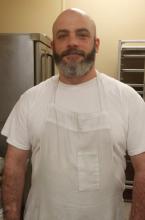
Since converting to Islam more than five years ago, Paul K. DeMelto of Cleveland has done all he could to become a more knowledgeable Muslim, attending a new converts class and hiring Arabic tutors to help him learn to read the Quran.
But despite his efforts, DeMelto found himself alone last Ramadan, the holiest month of the Muslim year, when adherents fast from sunrise to sunset and eat a communal meal at night.
As he looks to another Ramadan beginning today, DeMelto wonders if this might be the year when he finally lands an invitation to a fellow Muslim’s home for the iftar, the fast-breaking meal.

When I was invited by the Drug Policy Alliance to participate in a pastors’ conference at the American Baptist College in Nashville on drug decriminalization, I didn’t know quite what to expect. In a room filled with African-American pastors, I felt like a fly on the wall of someone else’s family reunion. I began to see our criminal justice system, and our country, through different eyes.
I’ve reported on the conference elsewhere, but there I learned that while 13 percent of drug users are African-American, they account for 38 percent of drug arrests and 59 percent of drug convictions. Feeling disproportionately targeted, the pastors want drug usage to be treated as a health issue rather than a crime.
As the conference unfolded, it dawned on me that I, as part of the majority culture, perceive law enforcement in ways strikingly different from the way many African-Americans see it. I have always experienced American authorities as my protector. If the police pull me over for speeding, it is nothing more than an annoyance, and the ticket won’t break me. Though I’m no fan of traffic cameras and drones, for the most part the police are there to watch out for me, and they do. It has always been that way for my family, as we can trace our roots of privilege back to Northern Europe in the early 1500s. Those in charge are the good guys who protect us and our stuff.
But for these African-American pastor-friends of mine, it’s a different story.

For our three-night sojourn in coastal Maine, far from crowds and constructive work, we stayed at a lovely bed-and-breakfast here called the Hodgdon Island Inn.
Once a sea captain’s home, it overlooks a small drawbridge to Barter’s Island. Farther along a seacoast marked by islands and coves lies the seasonally popular town of Boothbay Harbor.
I love the world of B&Bs. Each room is furnished in eclectic style, not hotel same-old. As an early riser, I like sitting by myself in a real living room with a coffee machine and wi-fi.

A California judge ruled Monday that the teaching of yoga in public schools does not establish a government interest in religion.
The decision came after parents sued the Encinitas Union School District to stop yoga classes introduced to elementary schoolchildren in the upscale suburb just north of San Diego.
In his opinion, San Diego Superior Court Judge John Meyer explained that although yoga is rooted in religion, it has a legitimate secular purpose in the district’s physical education program. He also said the practice, contrary to parents’ complaints, does not advance or inhibit religion.

WHEN I WAS growing up in the western suburbs of Chicago, I felt so far outside of the inner circle of cool kids that I didn’t even know where the circle was. So you can imagine my delight when I got an invitation to David’s birthday party. David was in the outer part of the inner circle, which meant I was heading in the right direction.
A couple days before the party, my mom took a closer look at the invitation and noticed that it said David’s parents would be making hot dogs for lunch. As she wasn’t sure whether the hot dogs were pork or beef, and as we were Muslims who don’t eat pork, she informed me that she’d be giving me all-beef franks to take from home with a note to David’s mom asking her to fry them up in a separate pan.
Of course, this horrified me, the kind of horror that only a kid caught up in the jungle of grade school coolness competition can feel. I remember standing in the living room, staring at my mom, and thinking to myself: “First, you named me Eboo.”
The day of the party rolled around and, dutiful Indian-Muslim child that I was, I accepted the little plastic baggie with two beef hot dogs that my mom handed me, allowed her to put me in nice slacks and a collared shirt, and went off to the party. When lunchtime came, I snuck into the kitchen to make my request of David’s parents. Imagine my surprise when I noticed another kid in the kitchen. He wore a collared shirt and nice slacks and also held a plastic baggie with two hot dogs.

The brouhaha surrounding Paula Deen, the Food Network star accused of tolerating a racist atmosphere in the kitchen of one of her restaurants, has sent my scapegoat antennae vibrating. Folks are lining up on opposite sides of the issue, to either defend or condemn this Queen of a Southern cooking financial empire. Dropped by the Food Network, Smithfield Foods, and now Walmart, and with a Facebook page populated by supporters, Paula Deen’s accusers and defenders are facing off like battalions on a battlefield. Extreme polarization like this is a symptom that scapegoating is underway, so I suggest everyone take a deep breath and back away from the deep fat fryer while I offer a few scapegoating observations.
The Verdict is Already In
Polarization is not about a search for truth. Polarization indicates that each side believes it is in possession of the truth and is running on overdrive, panting with the effort of making their accusation stick. “Paula Deen is a racist!” shout her accusers. “Why do you hate Southerners?” counter her defenders. No matter which side you are on, you are steadfastly, undeniably certain that you are in the possession of the truth and on the side of good.
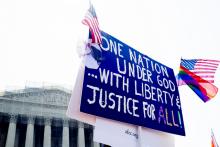
The words above the Supreme Court read, “Equal Justice Under the Law.” This week, two Supreme Court outcomes dramatically affected the reality of those words.
On Tuesday, in a 5-4 decision, a key component of the historic Voting Rights Act of 1965 was struck down, jeopardizing equal justice under the law especially for black, Hispanic, and low-income people whose voting rights have historically been assaulted and have continued to be suppressed as recently as the 2012 election. In fact, Section 4 of the Voting Rights Act — which required parts of the country that have been especially egregious in racially motivated voter suppression to get federal approval of any changes in their voting laws — was specifically used in the 2012 election to prevent new voter suppression. That provision has now been struck down, and efforts to increase barriers to voting are already underway in several states, especially in the South, that would suppress the future votes of Americans of color, especially those with lower incomes.
Equal justice under the law lost on Tuesday, June 25. The Supreme Court’s decision was morally shameful. ...
Contrast Tuesday’s decision with the final ones we saw handed down this week. ... I, along with a growing number of people in the faith community, believe that equal protection under the law is essential for our gay and lesbian friends and family members. While some Christians are conflicted about the theological issues involved, or even are unable to support homosexuality on a religious basis, they also don’t want churches to be the ones standing in the way of civil rights.
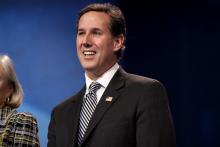
It’s not the message you might expect to hear from Rick Santorum, the Christian-conservative former presidential candidate: Faith-based films tend to be lousy, and Christians should quit trying to lock modern popular culture out of their lives.
Instead, Santorum says, Christian conservatives should acknowledge that modern popular culture is here to stay, and use that platform to produce Christian-themed films that will also have quality and popular appeal. It’s a strategy he says he intends to pursue in his new role as CEO of a ground-breaking faith-based film studio.
In an interview here, Santorum also stood by his strong views against same-sex marriage, citing the necessity to adhere to religious teachings — but then disputed his own religion’s leaders on the issue of immigration.
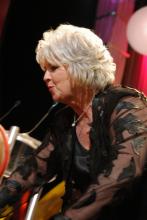
On Tuesday, the Supreme Court struck down part of the Voting Rights Act that was enacted in 1965 to root out racial discrimination in voting. The specific section of the Act that was stricken — Section 4 — set forth a formula for determining which jurisdictions need federal clearance before making even minor changes to voting procedures. The impact of striking Section 4 is that the most important part of the Act, Section 5, is now rendered useless. Section 5 provides that states, cities, and counties with a history of racial discrimination in voting must “pre-clear” changes to voting procedures with the Department of Justice or a special court in Washington, D.C. Without the formula in Section 4 to determine which states, cities, and counties the preclearance should apply to, the preemptive protection provided by Section 5 no longer exists, and any future challenges to changes in voting procedure must happen after such changes are already in effect.
The majority of the Court felt that racial minorities do not continue to face discriminatory voting practices, and that the preclearance requirement was based on 40-year-old facts that had no logical bearing on present day. Chief Justice Roberts, Jr., wrote:
“Our country has changed. While any racial discrimination in voting is too much, Congress must ensure that the legislation it passes to remedy that problem speaks to current conditions.”
The practical application of Tuesday's decision is that states will be able to enact potentially discriminatory laws that previously had been blocked. This was made immediately apparent in Texas, which announced after the ruling that voter identification laws would go into effect immediately.